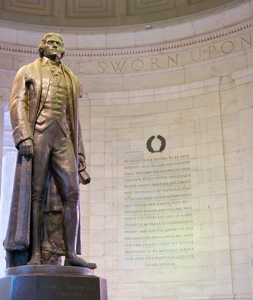Architecture: The Jefferson Memorial

When it was suggested that a new presidential monument beside the Tidal Basin in D.C., the original honoree was to have been Teddy Roosevelt. Bully!
Thomas Jefferson admired neoclassical architecture, bringing its formal style to both his Monticello home and his design for the University of Virginia. So when architect John Russell Pope won the competition to memorialize Jefferson, he leaned on the president’s precedent, which was prescient.
Construction began in 1939, and not everyone was happy. Some wanted to honor Teddy Roosevelt instead. Some wanted the memorial in a different location. Others called the neoclassical style “safely dead.” Pope had a unique way of addressing his critics: he died.
Construction went ahead as we all know, and the structure was dedicated by FDR in 1943. One detail remained – because of the war, the bronze statue of Jefferson couldn’t be completed. So the construction team took a plaster cast and painted it to look like bronze. The actual sculpture was finally put in place in 1947.
When the American Institute of Architects surveyed the public to determine its favorite American structures, the Jefferson Memorial was the fourth most popular, topped only by the Empire State Building (Great American Things, May 13, 2009), the White House, and the Washington National Cathedral (Mar. 4, 2010).

